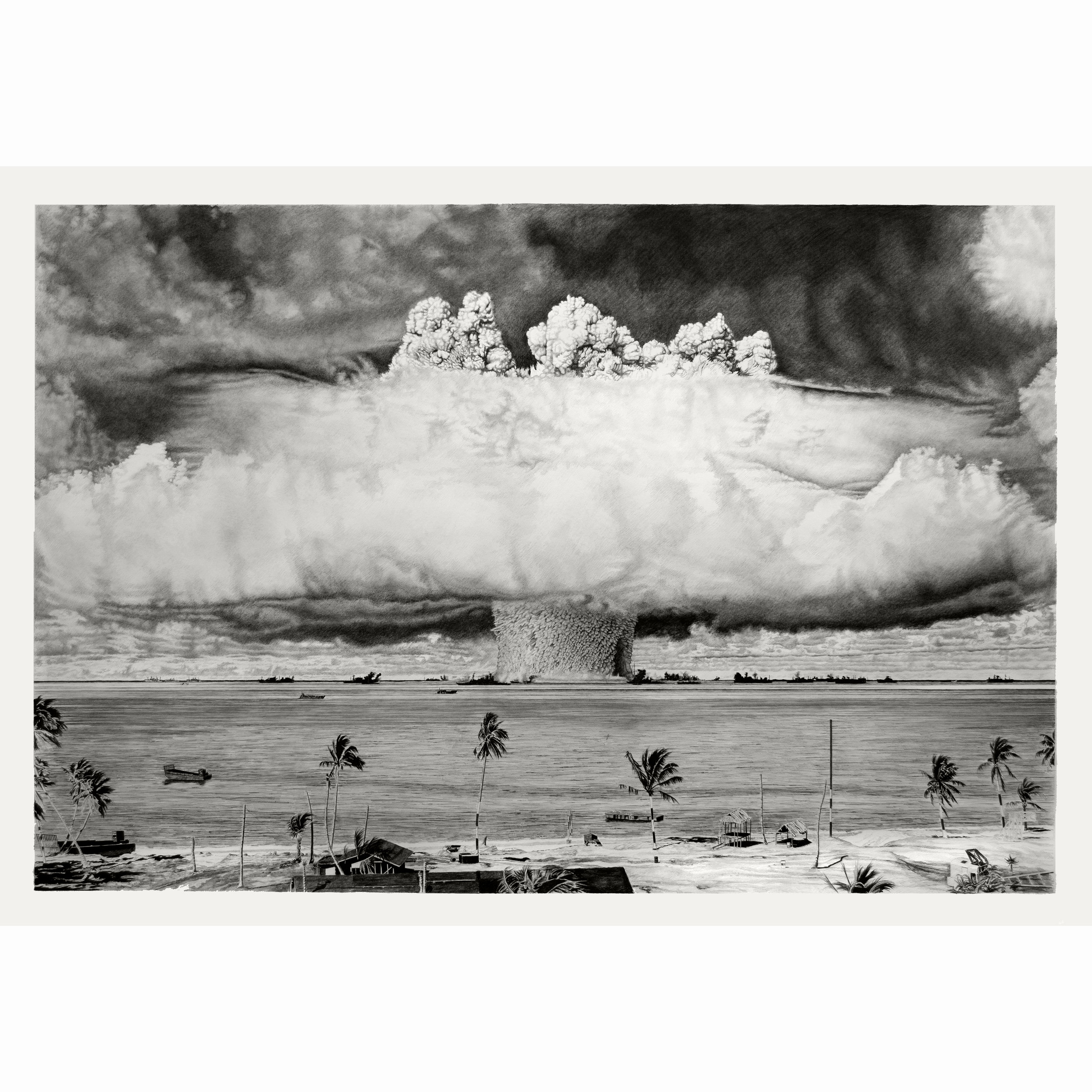
2018
41in x 60.5in
Charcoal & Graphite on Paper
Private Collection
As part of a series of US nuclear weapon tests known as Operation Crossroads in 1946, a 23-kiloton nuke called Baker was blasted 90 feet underwater at Bikini Atoll. Many of the test ships were subsequently towed back to the Hunter’s Point Naval Shipyard in San Francisco and de-radiated by a process of sandblasting in the drydocks on site, creating radioactive contamination that still exists today. Reference photo dated: July, 1946, courtesy of the U.S. Navy.
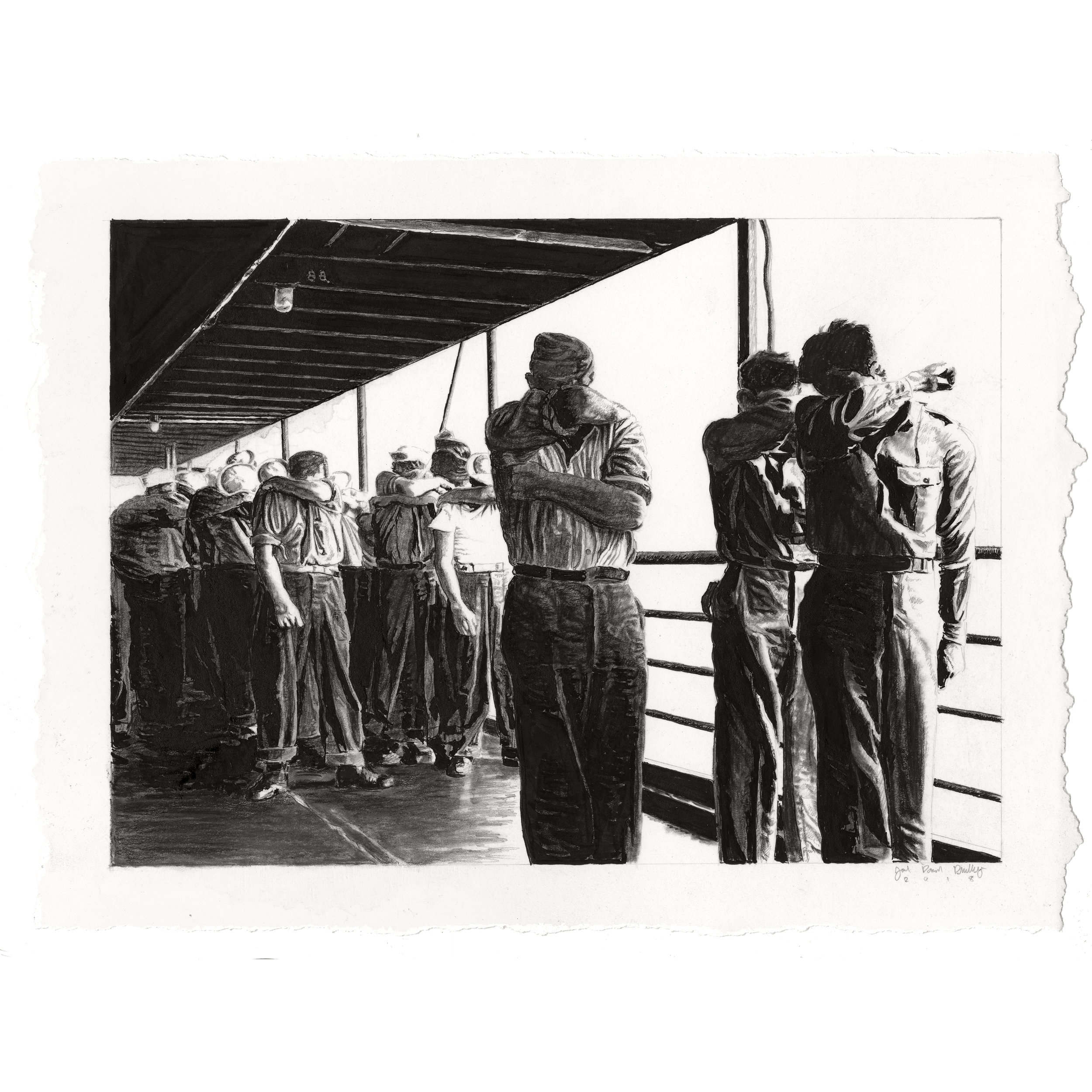
2018
9in x 12in
Charcoal, Graphite & Ink on Paper
Private Collection
American sailors shield their eyes during a nuclear test at Bikini Atoll. Many sailors spoke of being able to see their bones through their arms, the flash was so bright. Reference photo by Fritz Goro dated: July, 1946.
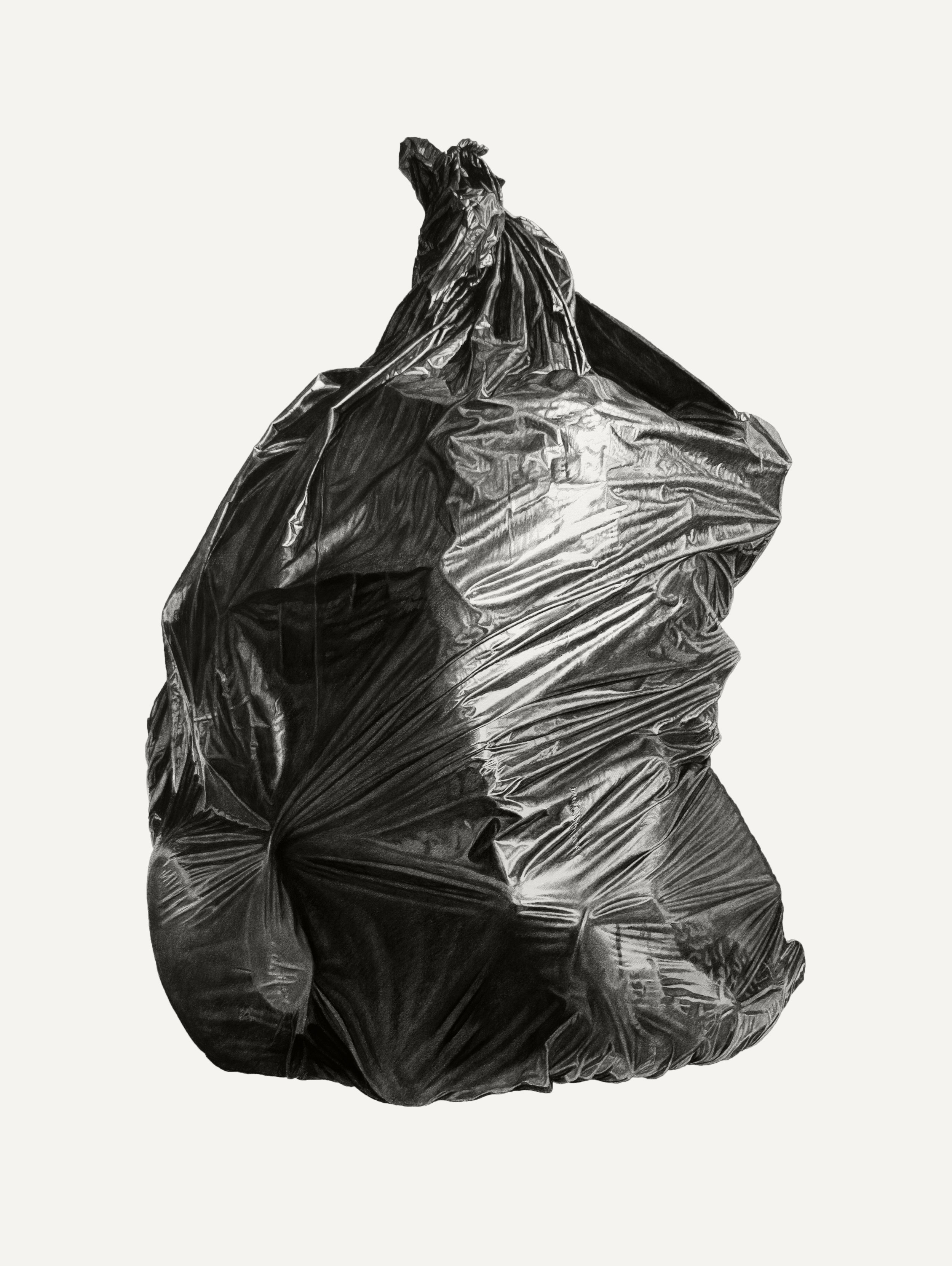
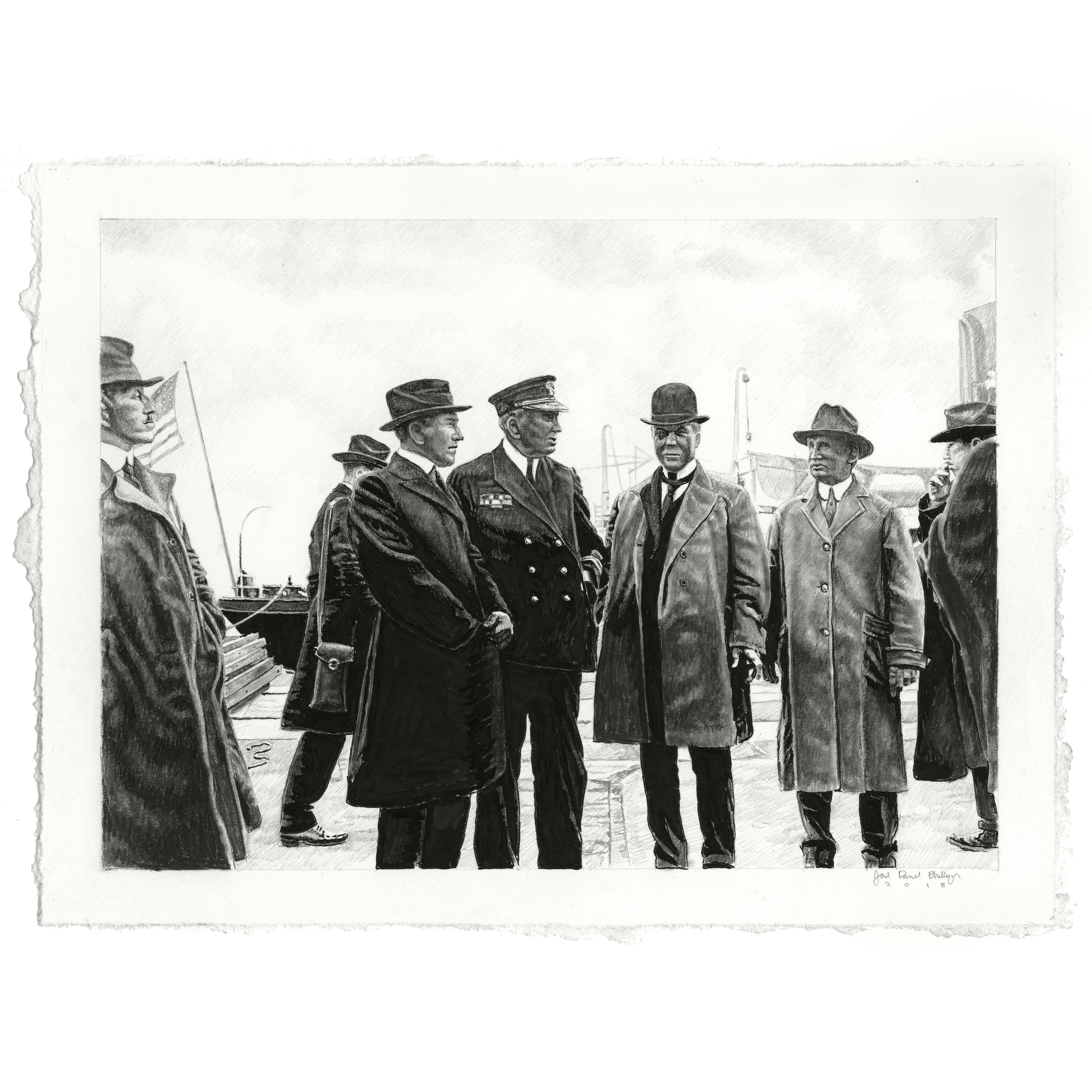
2018
9in x 12in
Charcoal, Graphite & Ink on Paper
Private Collection
Naval Base Committee and Mayor Rolph inspect the Hunters Point Naval Shipyard. Reference photo dated: Nov 16, 1920, courtesy of the Open SF History Project.
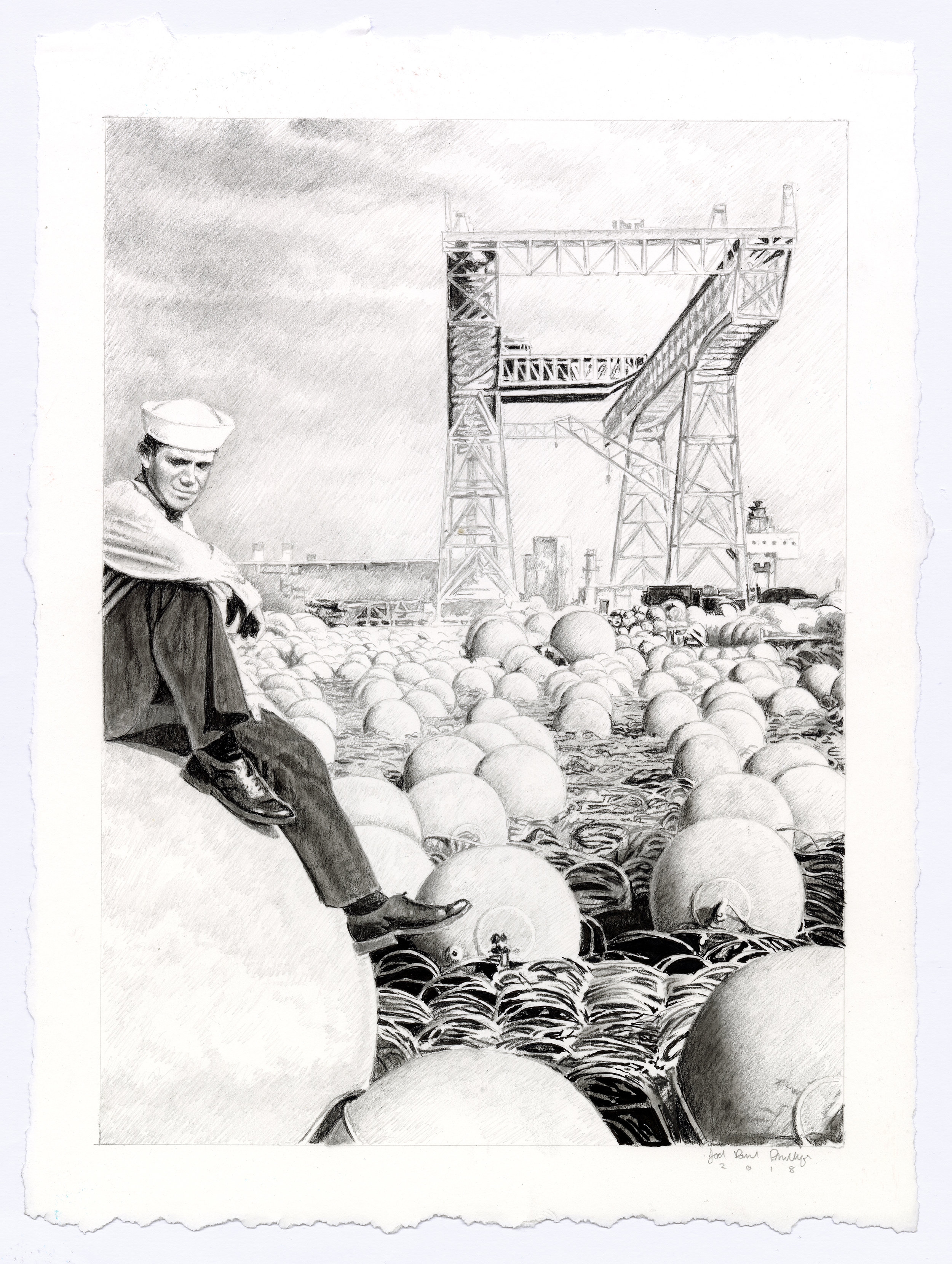
2018
12in x 9in
Charcoal, Graphite & Ink on Paper
Private Collection
Steve Matthews, of the U.S.S. Evans, sits in a field of floats used to support harbor defense nets at Hunters Point Naval Shipyard. Reference photo dated Dec 18, 1963, courtesy of the San Francisco History Center, San Francisco Public Library.
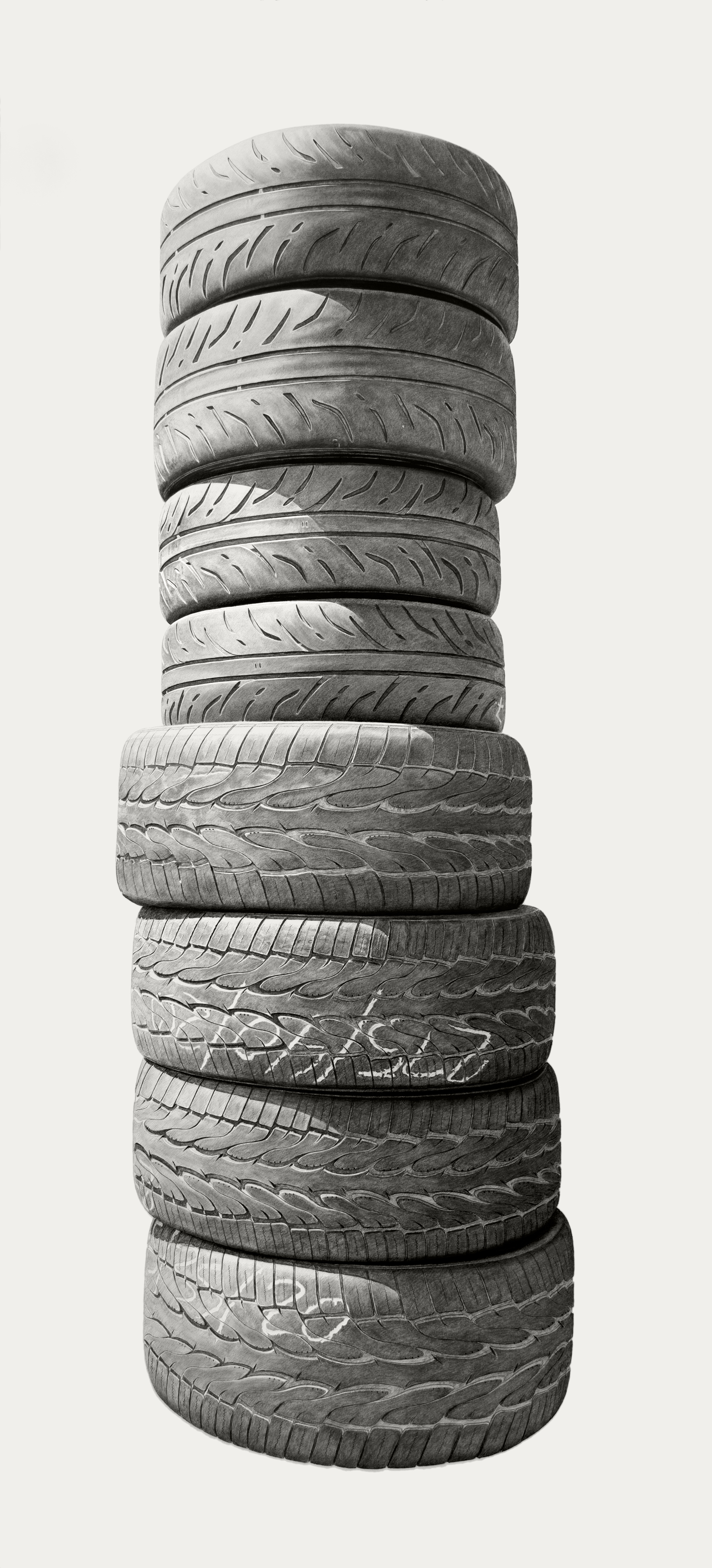
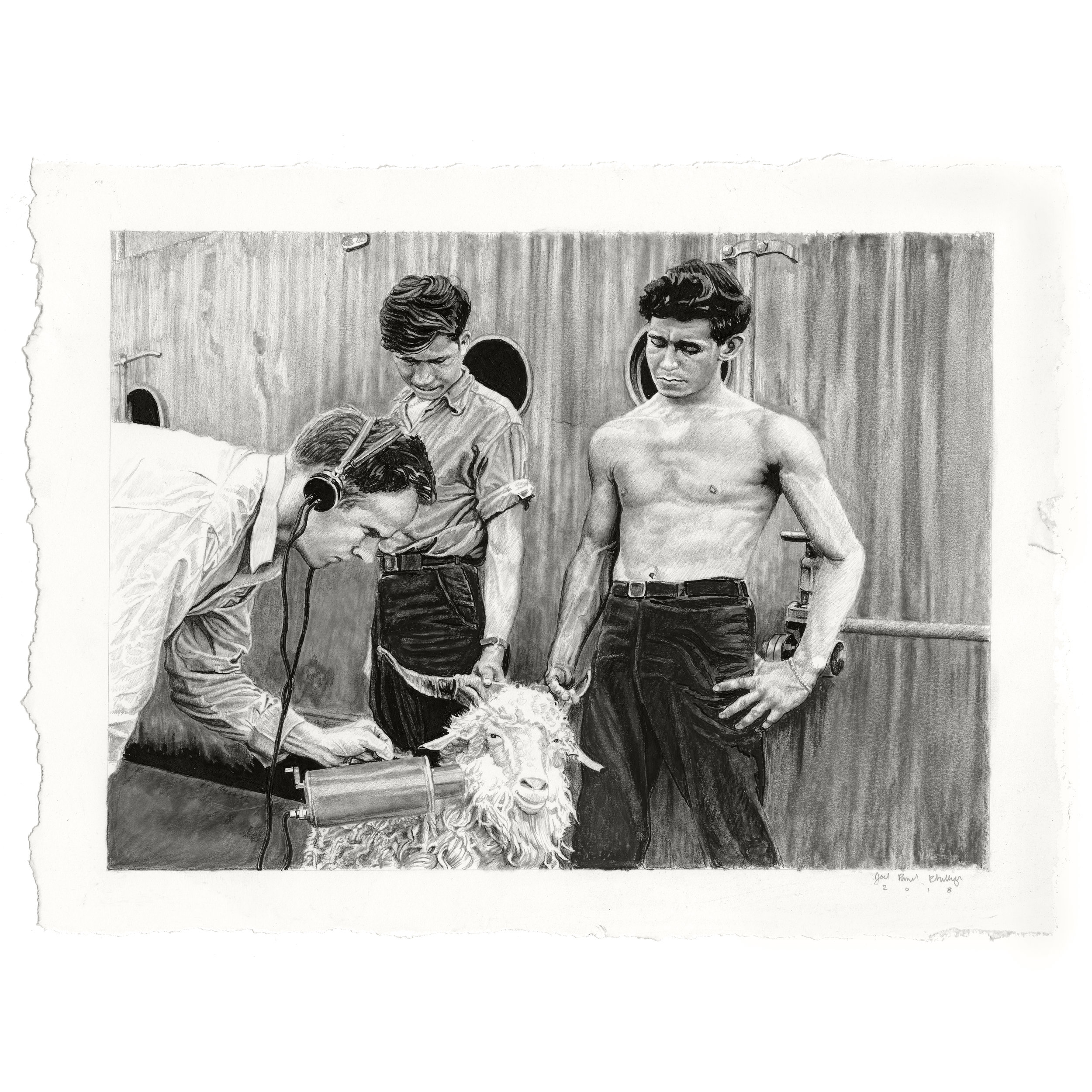
2018
9in x 12in
Charcoal, Graphite & Ink on Paper
Private Collection
A goat used as a test animal during Operation Crossroads at Bikini Atoll is tested for radiation exposure. Reference photo by Fritz Goro dated July, 1946.
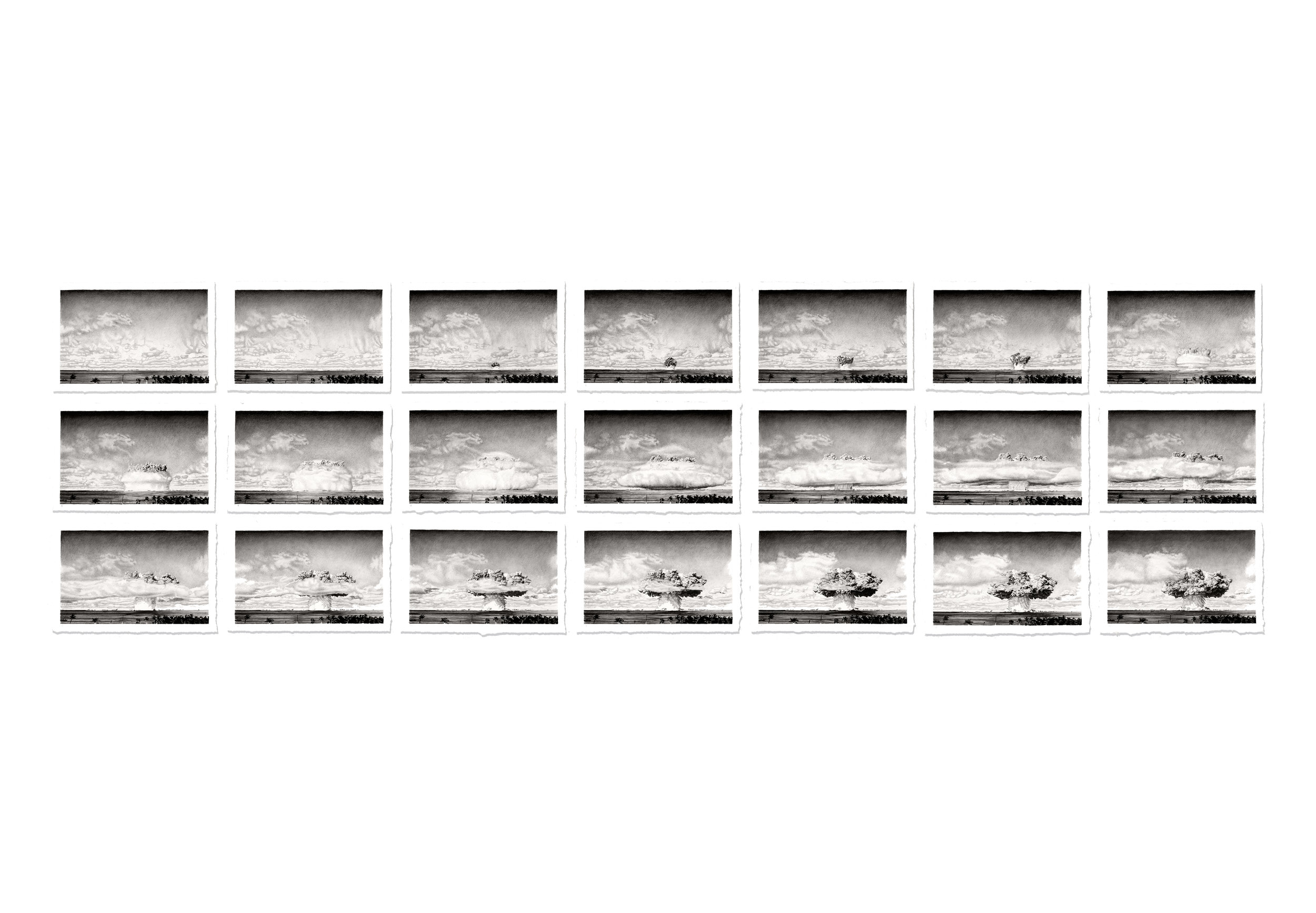
2018
21 Pieces, 8in x 12in ea
Charcoal, Graphite & Ink on Paper
Permanent Collection, Fort Wayne Museum of Art
(click through for the full animation)
As part of a series of US nuclear weapon tests known as Operation Crossroads in 1946, a 23-kiloton nuke called Baker was blasted 90 feet underwater at Bikini Atoll. Reference film dated: July, 1946, courtesy of the U.S. Navy.

2018
21 Pieces, 8in x 12in ea
Charcoal, Graphite & Ink on Paper
Permanent Collection, Fort Wayne Museum of Art
(click through for the full animation)
As part of a series of US nuclear weapon tests known as Operation Crossroads in 1946, a 23-kiloton nuke called Baker was blasted 90 feet underwater at Bikini Atoll. Reference film dated: July, 1946, courtesy of the U.S. Navy.
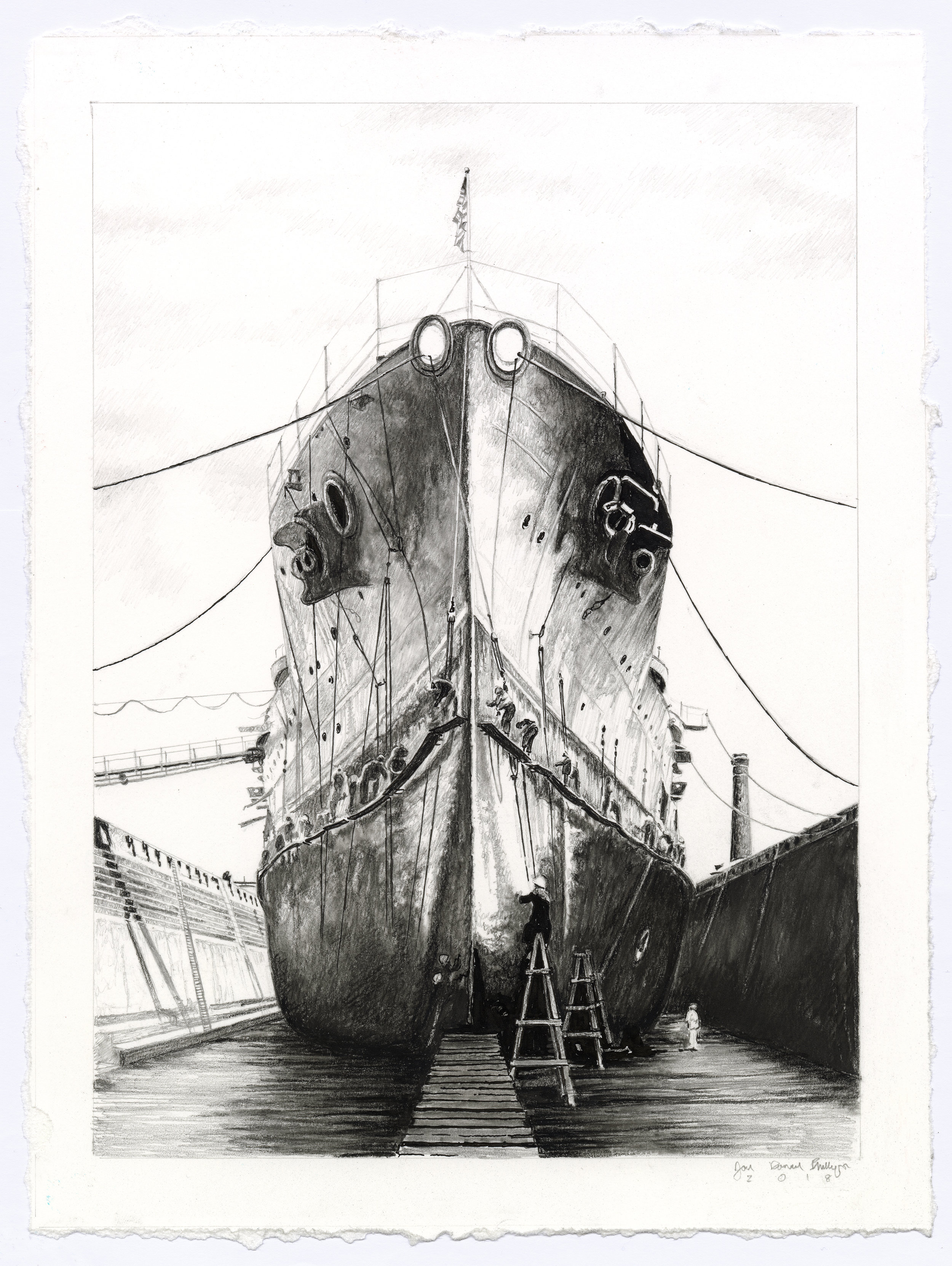
2018
12in x 9in
Charcoal, Graphite & Ink on Paper
Private Collection
Navy ship U.S.S. Pennsylvania in drydock at the Hunters Point Naval Shipyard while zealous Naval workers industriously refitting the cladding. Reference photos by DPW Horace Chaffee dated circa 1919, courtesy of the Open SF History Project.
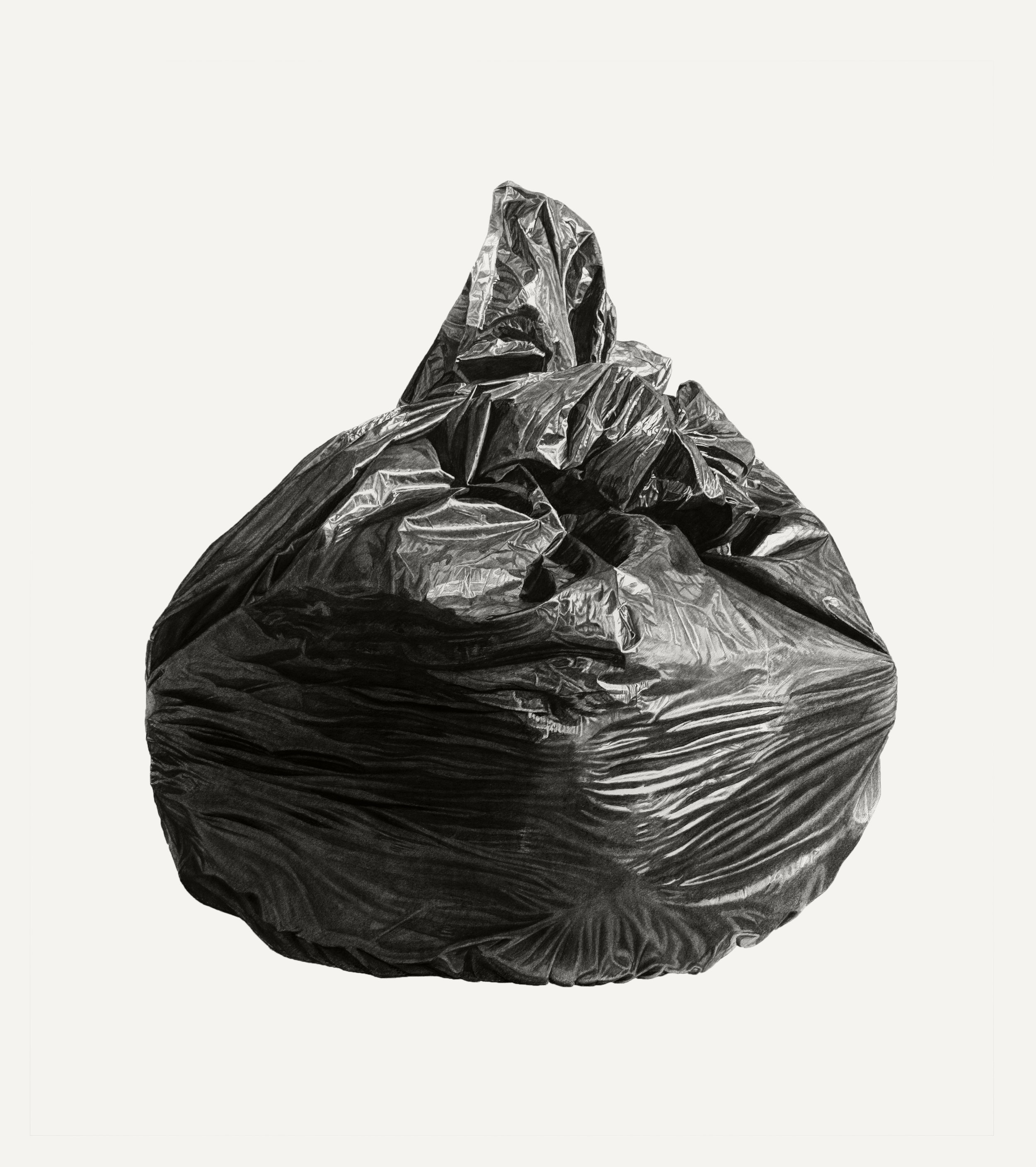
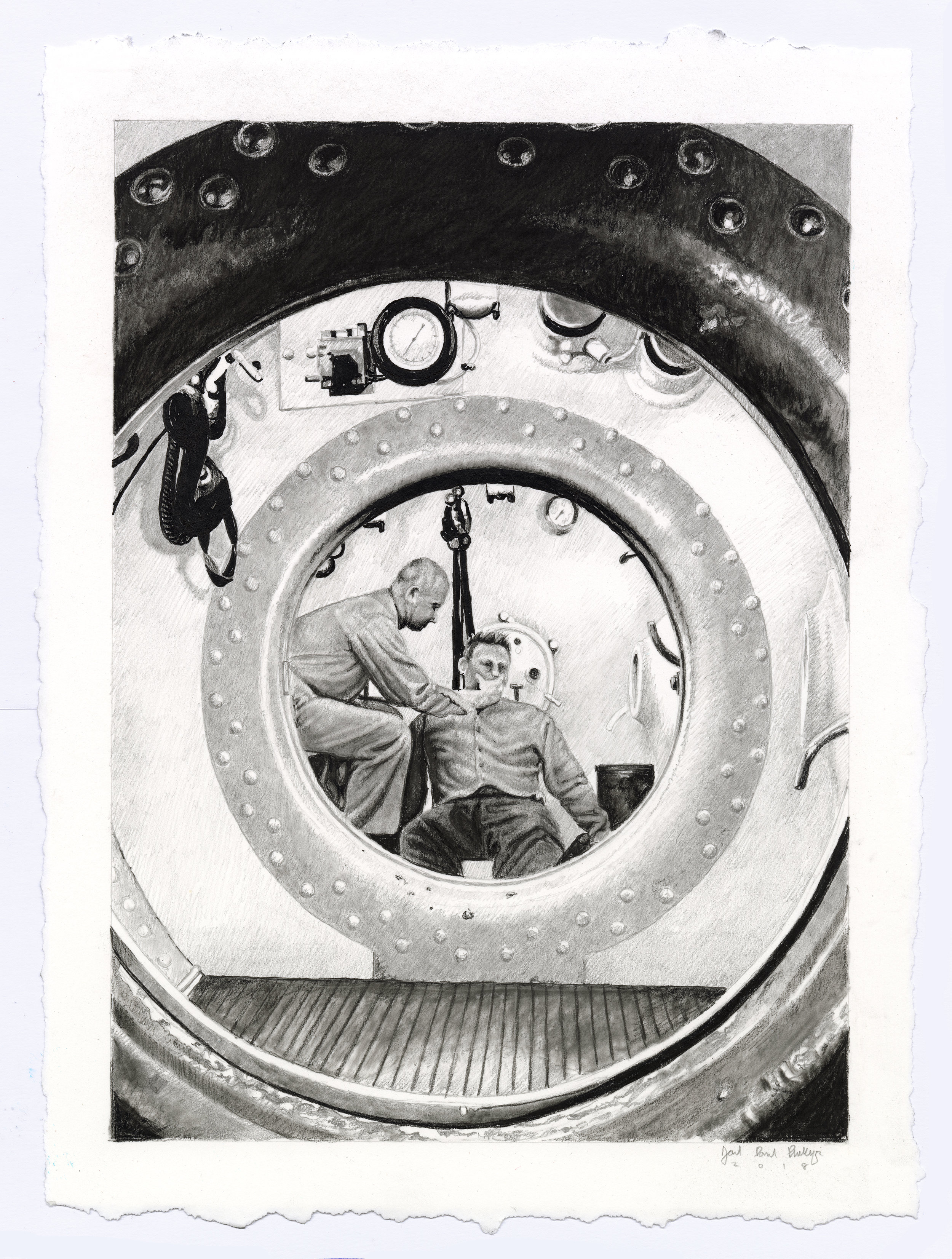
2018
12in x 9in
Charcoal, Graphite & Ink on Paper
Private Collection
Sitting on a barge at a pier at Hunters Point Naval Shipyard is a link to life for skin divers from all Northern California. It is a decompression chamber for treatment of divers who suffer that most painful of all diving accidents - the bends. It is the only continuously manned chamber in all Northern California. Its’ crewmen - most of them expert Navy divers - are on constant alert, and may not so much as go to town without leaving word of when they will be where. Reference photo dated January 30, 1965, courtesy of the San Francisco History Center, San Francisco Public Library.
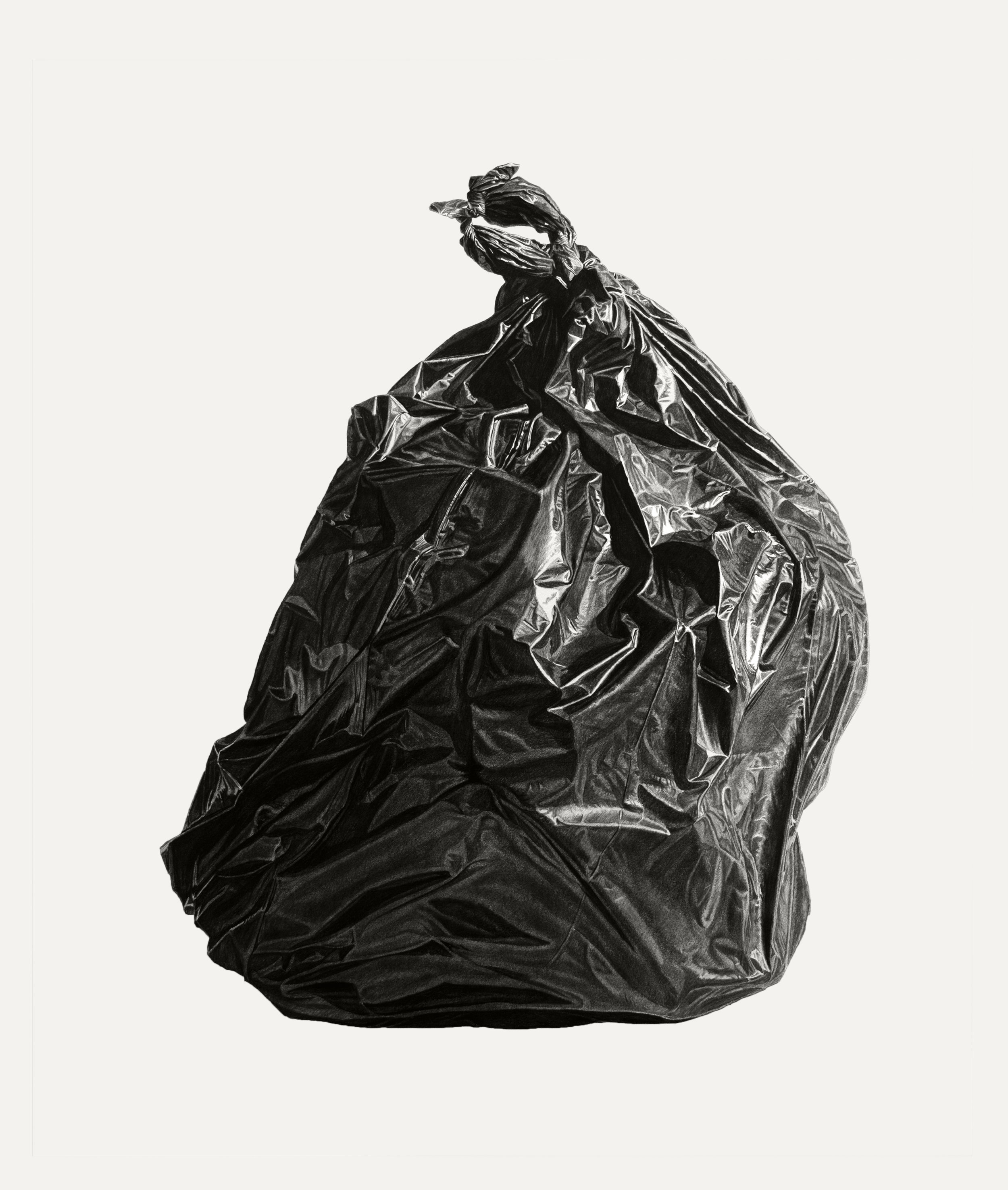
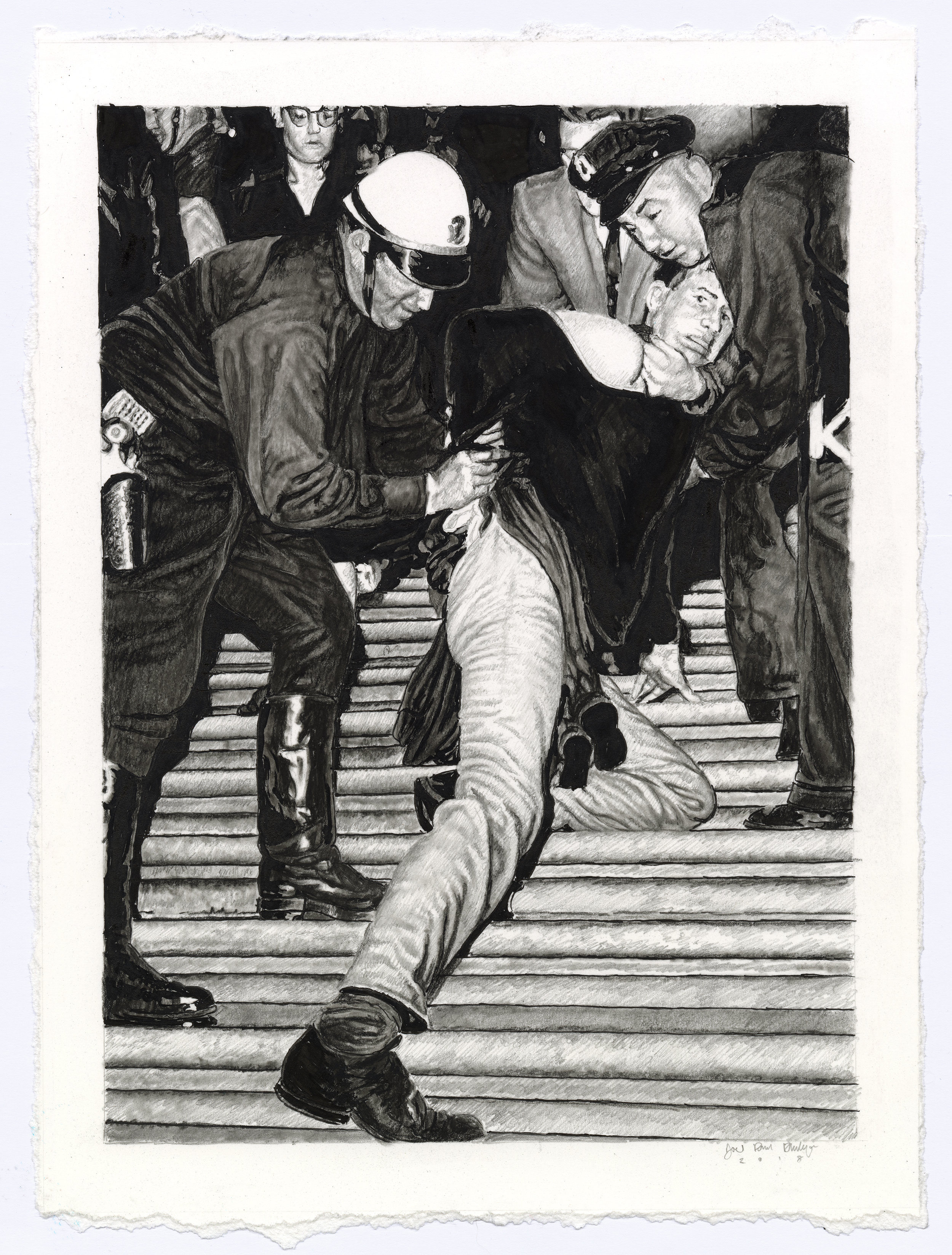
2018
12in x 9in
Charcoal, Graphite & Ink on Paper
Private Collection
Every muscle tense, this demonstrator who participated in the riotous uproar at the Red hearing fights every inch of the way against being propelled down the marble steps of City Hall in the iron grip of two officers. Foot and knee are braced, but futile against the concerted clearing-out of the demonstrators. Reference photo by Bob Jones dated May 13, 1960, courtesy of the San Francisco History Center, San Francisco Public Library.
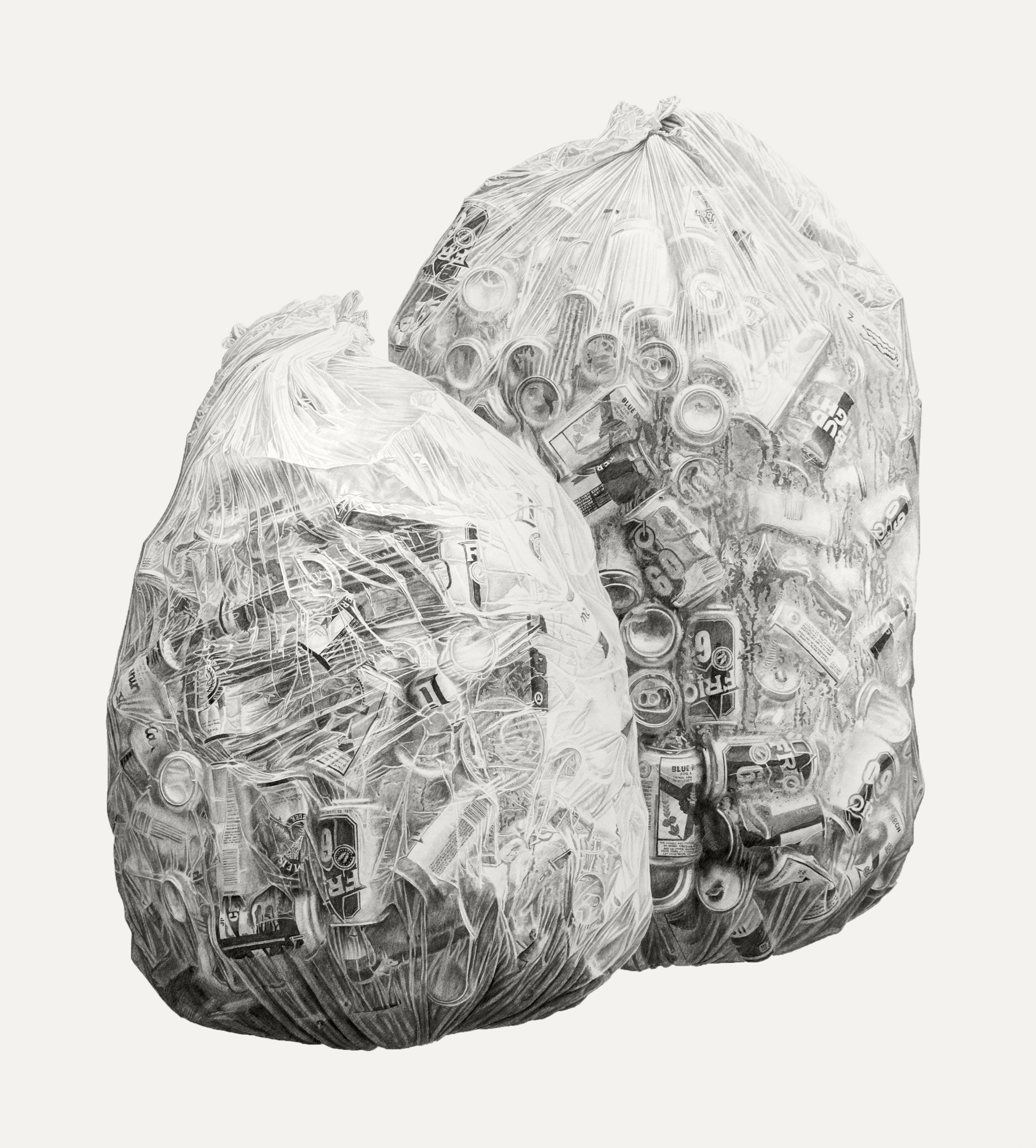
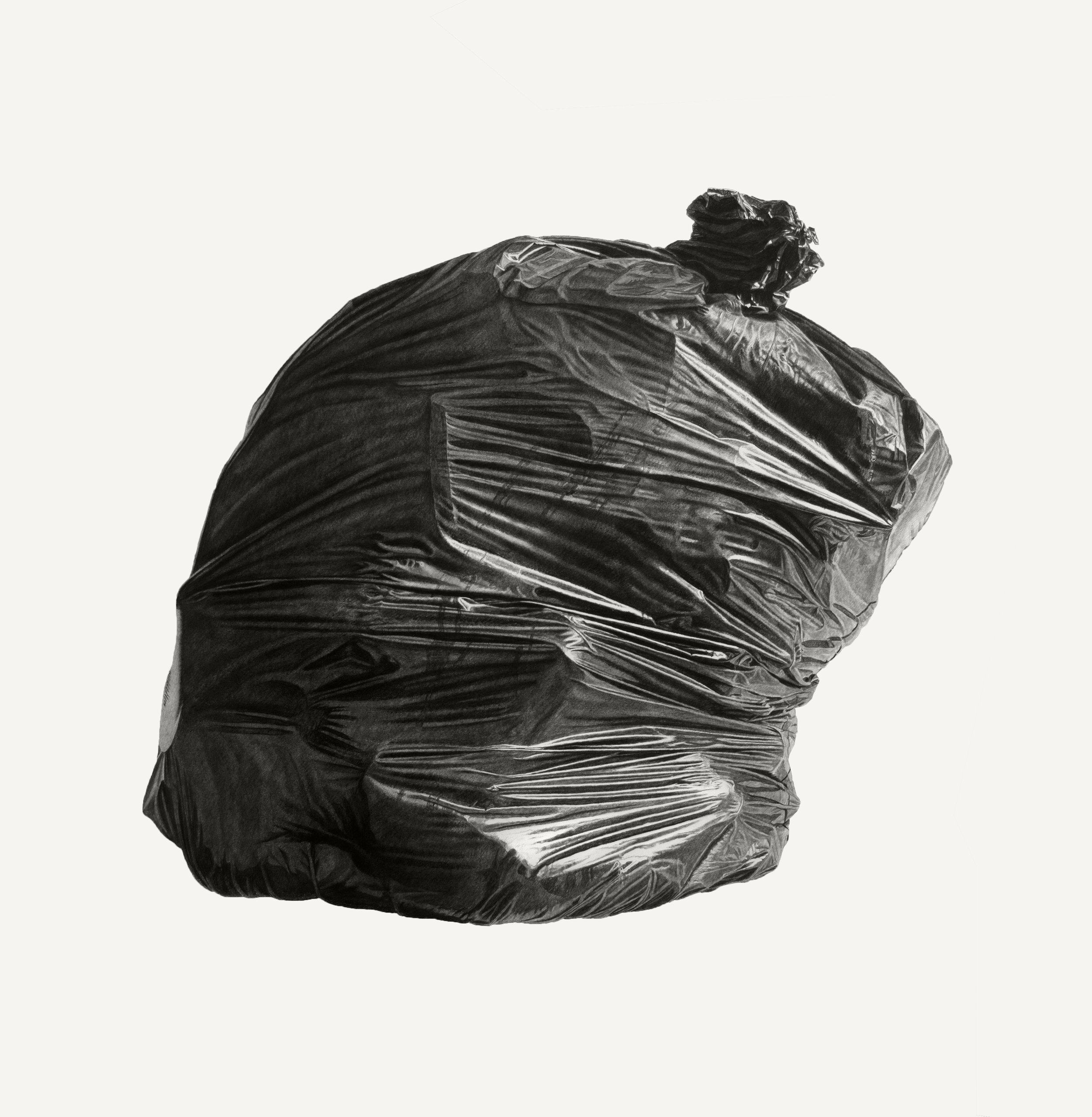
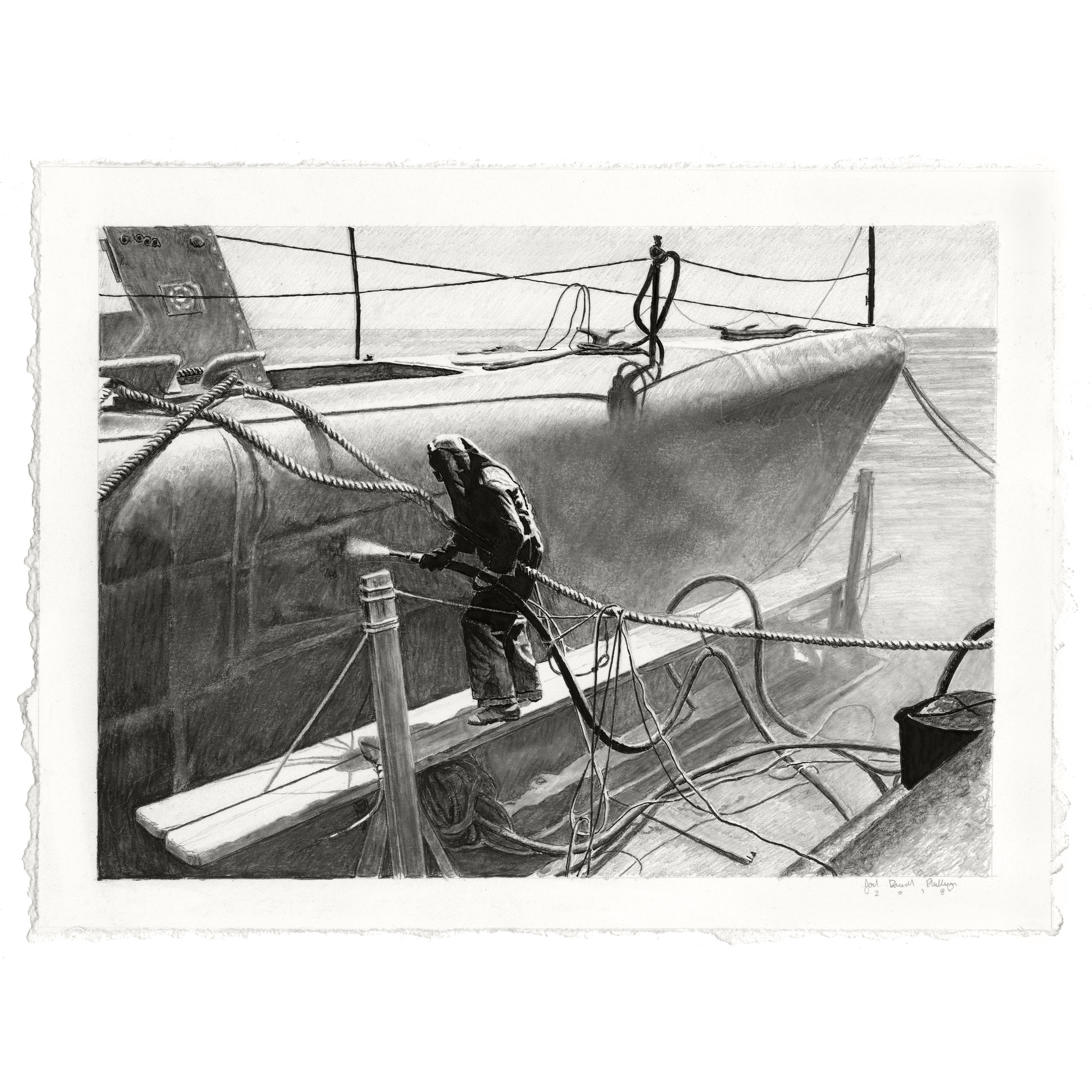
2018
9in x 12in
Charcoal, Graphite & Ink on Paper
Private Collection
A Navy workman at the Hunters Point Naval Shipyard sandblasts radioactive paint off the side of submarine contaminated during the Baker nuclear test. After use the now-radioactive waste sand was black and glassy in appearance and was referred to as “black beauty sand” by the neighborhood children who would play in it. Reference photo by Fritz Goro dated: July, 1946.
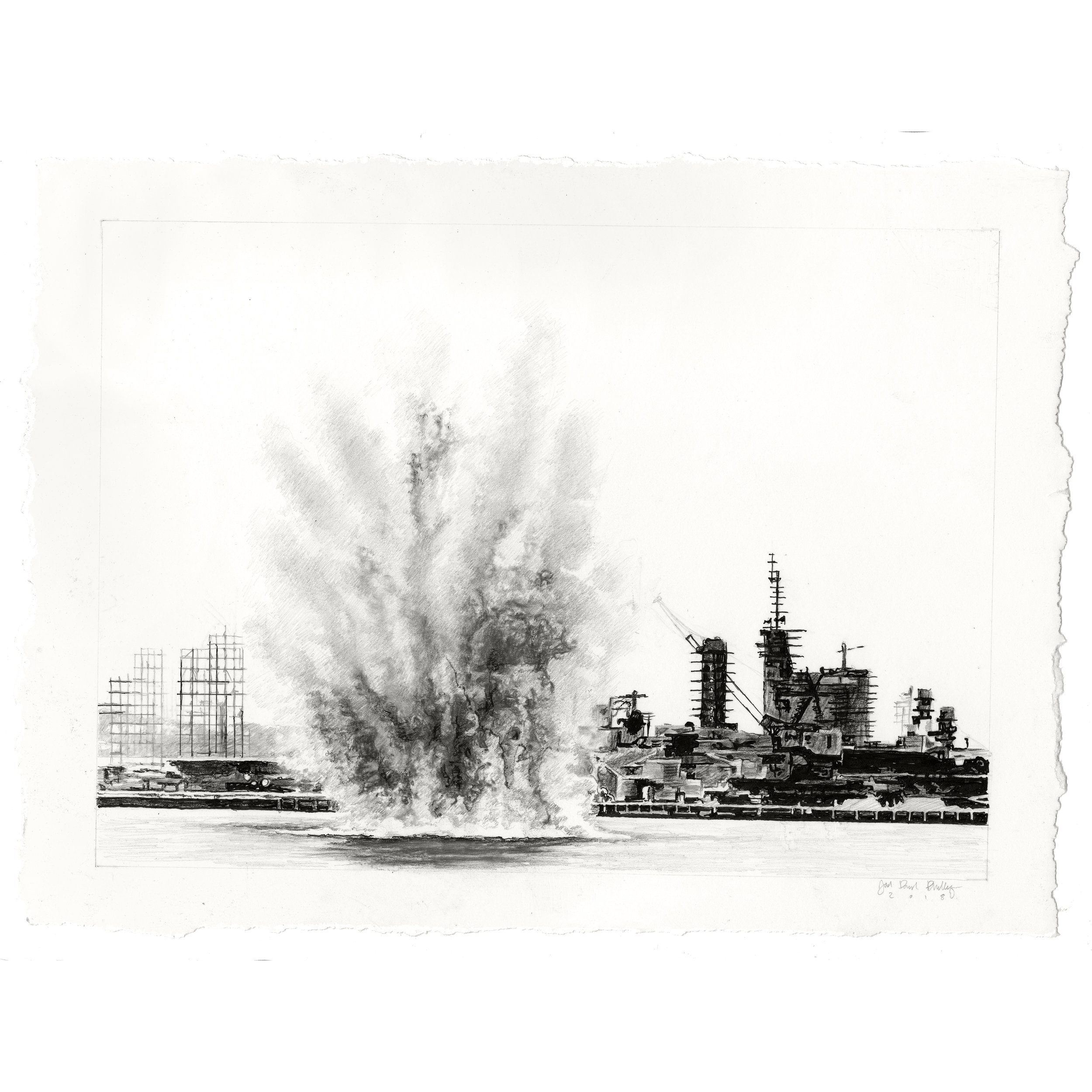
2018
9in x 12in
Charcoal, Graphite & Ink on Paper
Private Collection
Reference photo dated January 29, 1963, courtesy of the San Francisco History Center, San Francisco Public Library.
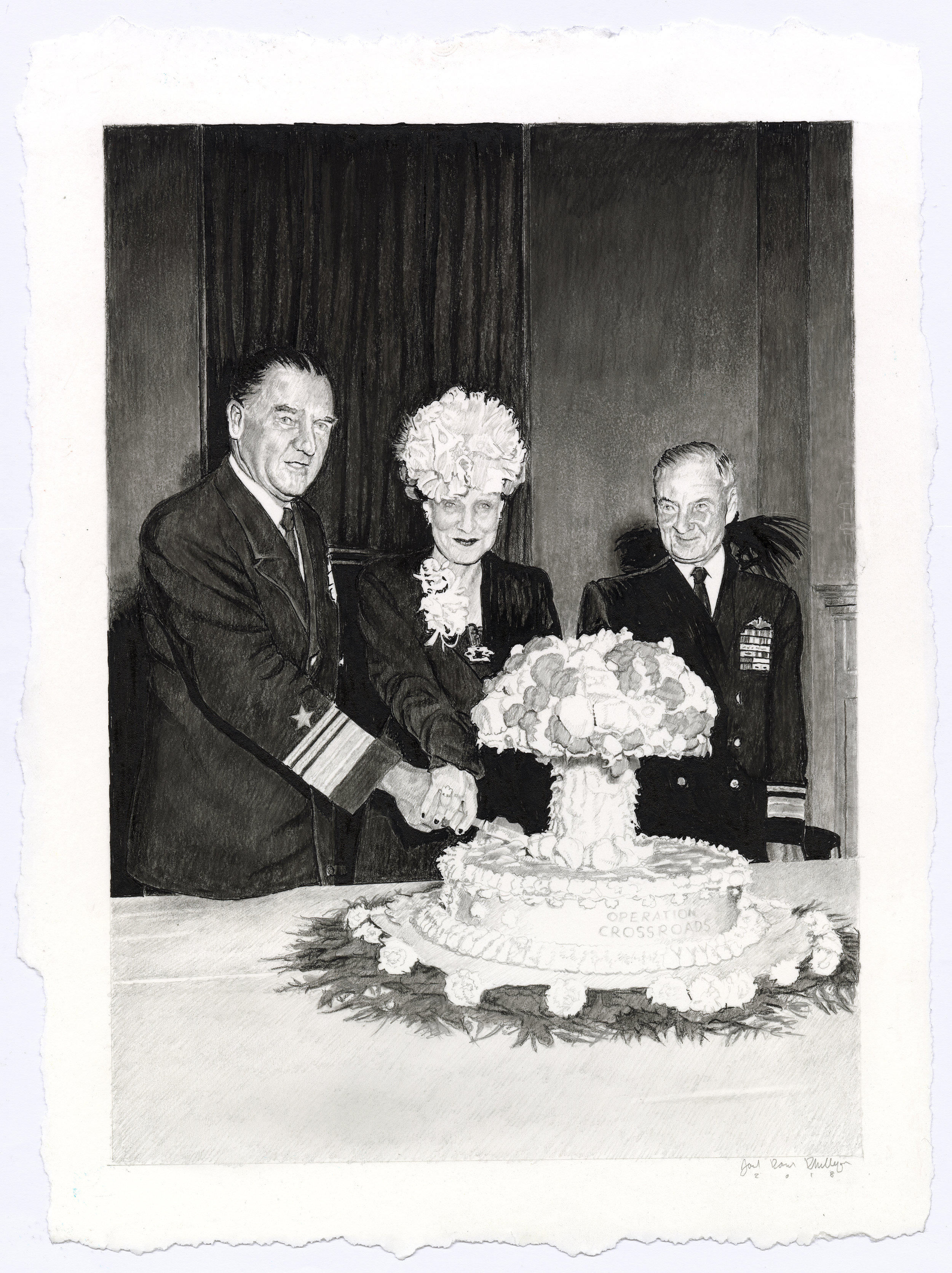
2018
12in x 9in
Charcoal, Graphite & Ink on Paper
Private Collection
Vice Admiral W.H.P. Blandy, Mrs. Blandy and Rear Admiral F.J. Lowery at a reception with a cake resembling the mushroom shape cloud made by an atomic bomb explosion. The cake design was a celebration of Operation Crossroads, a United States program that tested nuclear weapons in the Marshall Islands. The party was held in Washington, D.C.. Reference photo dated November 6, 1946.
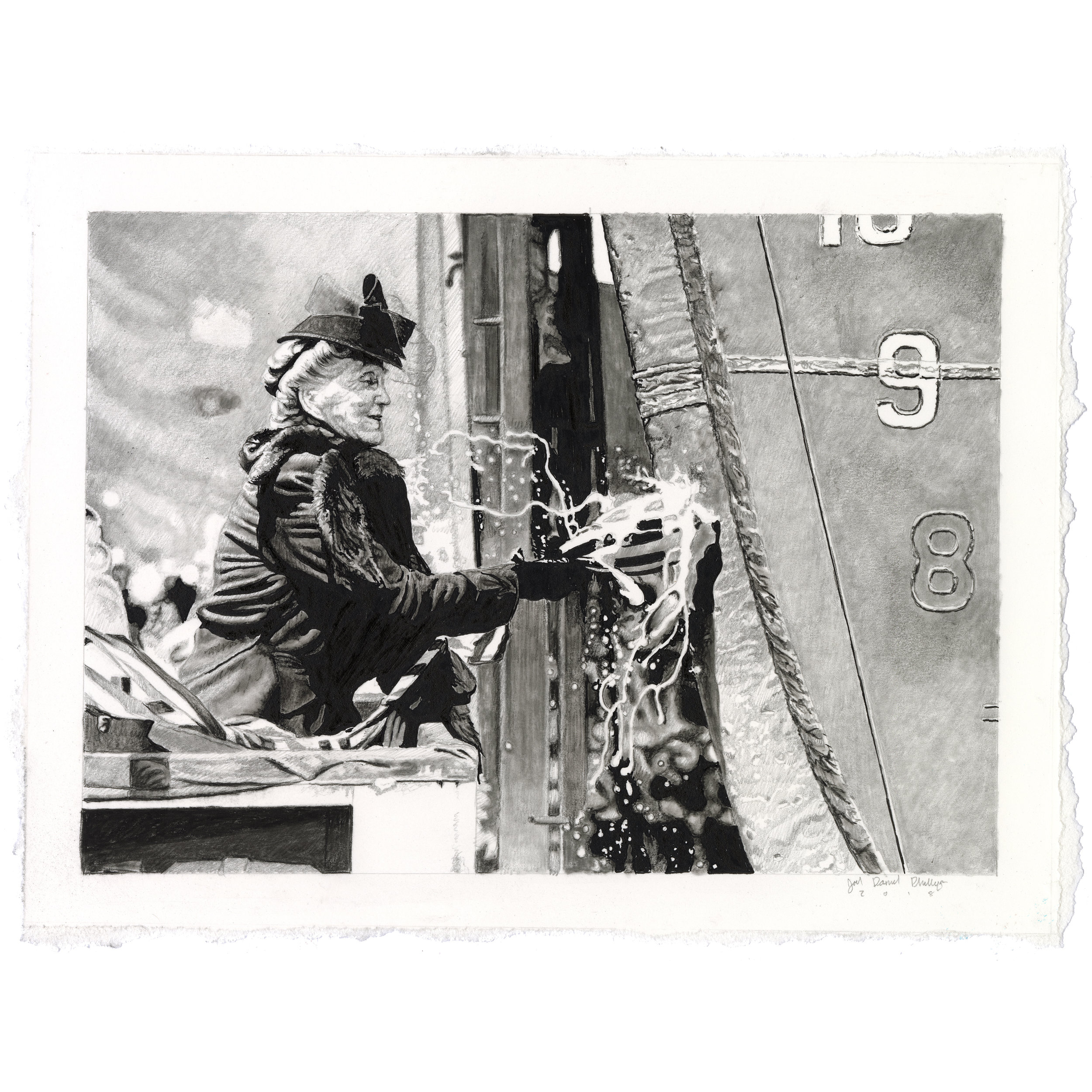
2018
9in x 12in
Charcoal, Graphite & Ink on Paper
Private Collection
Mrs. Edward G. Cahill christened the U.S.S. Gladwin, destined for service as a Navy Transport, at the South San Francisco shipyard of Western Pipe & Steel Co. yesterday afternoon. Her husband, San Francisco's Manager of Utilities, was credited with an assist for throwing the switch to send the vessel down the ways. Reference photo dated: April 28, 1944, courtesy of the San Francisco History Center, San Francisco Public Library.




















2018
41in x 60.5in
Charcoal & Graphite on Paper
Private Collection
As part of a series of US nuclear weapon tests known as Operation Crossroads in 1946, a 23-kiloton nuke called Baker was blasted 90 feet underwater at Bikini Atoll. Many of the test ships were subsequently towed back to the Hunter’s Point Naval Shipyard in San Francisco and de-radiated by a process of sandblasting in the drydocks on site, creating radioactive contamination that still exists today. Reference photo dated: July, 1946, courtesy of the U.S. Navy.
2018
9in x 12in
Charcoal, Graphite & Ink on Paper
Private Collection
American sailors shield their eyes during a nuclear test at Bikini Atoll. Many sailors spoke of being able to see their bones through their arms, the flash was so bright. Reference photo by Fritz Goro dated: July, 1946.
2018
9in x 12in
Charcoal, Graphite & Ink on Paper
Private Collection
Naval Base Committee and Mayor Rolph inspect the Hunters Point Naval Shipyard. Reference photo dated: Nov 16, 1920, courtesy of the Open SF History Project.
2018
12in x 9in
Charcoal, Graphite & Ink on Paper
Private Collection
Steve Matthews, of the U.S.S. Evans, sits in a field of floats used to support harbor defense nets at Hunters Point Naval Shipyard. Reference photo dated Dec 18, 1963, courtesy of the San Francisco History Center, San Francisco Public Library.
2018
9in x 12in
Charcoal, Graphite & Ink on Paper
Private Collection
A goat used as a test animal during Operation Crossroads at Bikini Atoll is tested for radiation exposure. Reference photo by Fritz Goro dated July, 1946.
2018
21 Pieces, 8in x 12in ea
Charcoal, Graphite & Ink on Paper
Permanent Collection, Fort Wayne Museum of Art
(click through for the full animation)
As part of a series of US nuclear weapon tests known as Operation Crossroads in 1946, a 23-kiloton nuke called Baker was blasted 90 feet underwater at Bikini Atoll. Reference film dated: July, 1946, courtesy of the U.S. Navy.
2018
21 Pieces, 8in x 12in ea
Charcoal, Graphite & Ink on Paper
Permanent Collection, Fort Wayne Museum of Art
(click through for the full animation)
As part of a series of US nuclear weapon tests known as Operation Crossroads in 1946, a 23-kiloton nuke called Baker was blasted 90 feet underwater at Bikini Atoll. Reference film dated: July, 1946, courtesy of the U.S. Navy.
2018
12in x 9in
Charcoal, Graphite & Ink on Paper
Private Collection
Navy ship U.S.S. Pennsylvania in drydock at the Hunters Point Naval Shipyard while zealous Naval workers industriously refitting the cladding. Reference photos by DPW Horace Chaffee dated circa 1919, courtesy of the Open SF History Project.
2018
12in x 9in
Charcoal, Graphite & Ink on Paper
Private Collection
Sitting on a barge at a pier at Hunters Point Naval Shipyard is a link to life for skin divers from all Northern California. It is a decompression chamber for treatment of divers who suffer that most painful of all diving accidents - the bends. It is the only continuously manned chamber in all Northern California. Its’ crewmen - most of them expert Navy divers - are on constant alert, and may not so much as go to town without leaving word of when they will be where. Reference photo dated January 30, 1965, courtesy of the San Francisco History Center, San Francisco Public Library.
2018
12in x 9in
Charcoal, Graphite & Ink on Paper
Private Collection
Every muscle tense, this demonstrator who participated in the riotous uproar at the Red hearing fights every inch of the way against being propelled down the marble steps of City Hall in the iron grip of two officers. Foot and knee are braced, but futile against the concerted clearing-out of the demonstrators. Reference photo by Bob Jones dated May 13, 1960, courtesy of the San Francisco History Center, San Francisco Public Library.
2018
9in x 12in
Charcoal, Graphite & Ink on Paper
Private Collection
A Navy workman at the Hunters Point Naval Shipyard sandblasts radioactive paint off the side of submarine contaminated during the Baker nuclear test. After use the now-radioactive waste sand was black and glassy in appearance and was referred to as “black beauty sand” by the neighborhood children who would play in it. Reference photo by Fritz Goro dated: July, 1946.
2018
9in x 12in
Charcoal, Graphite & Ink on Paper
Private Collection
Reference photo dated January 29, 1963, courtesy of the San Francisco History Center, San Francisco Public Library.
2018
12in x 9in
Charcoal, Graphite & Ink on Paper
Private Collection
Vice Admiral W.H.P. Blandy, Mrs. Blandy and Rear Admiral F.J. Lowery at a reception with a cake resembling the mushroom shape cloud made by an atomic bomb explosion. The cake design was a celebration of Operation Crossroads, a United States program that tested nuclear weapons in the Marshall Islands. The party was held in Washington, D.C.. Reference photo dated November 6, 1946.
2018
9in x 12in
Charcoal, Graphite & Ink on Paper
Private Collection
Mrs. Edward G. Cahill christened the U.S.S. Gladwin, destined for service as a Navy Transport, at the South San Francisco shipyard of Western Pipe & Steel Co. yesterday afternoon. Her husband, San Francisco's Manager of Utilities, was credited with an assist for throwing the switch to send the vessel down the ways. Reference photo dated: April 28, 1944, courtesy of the San Francisco History Center, San Francisco Public Library.